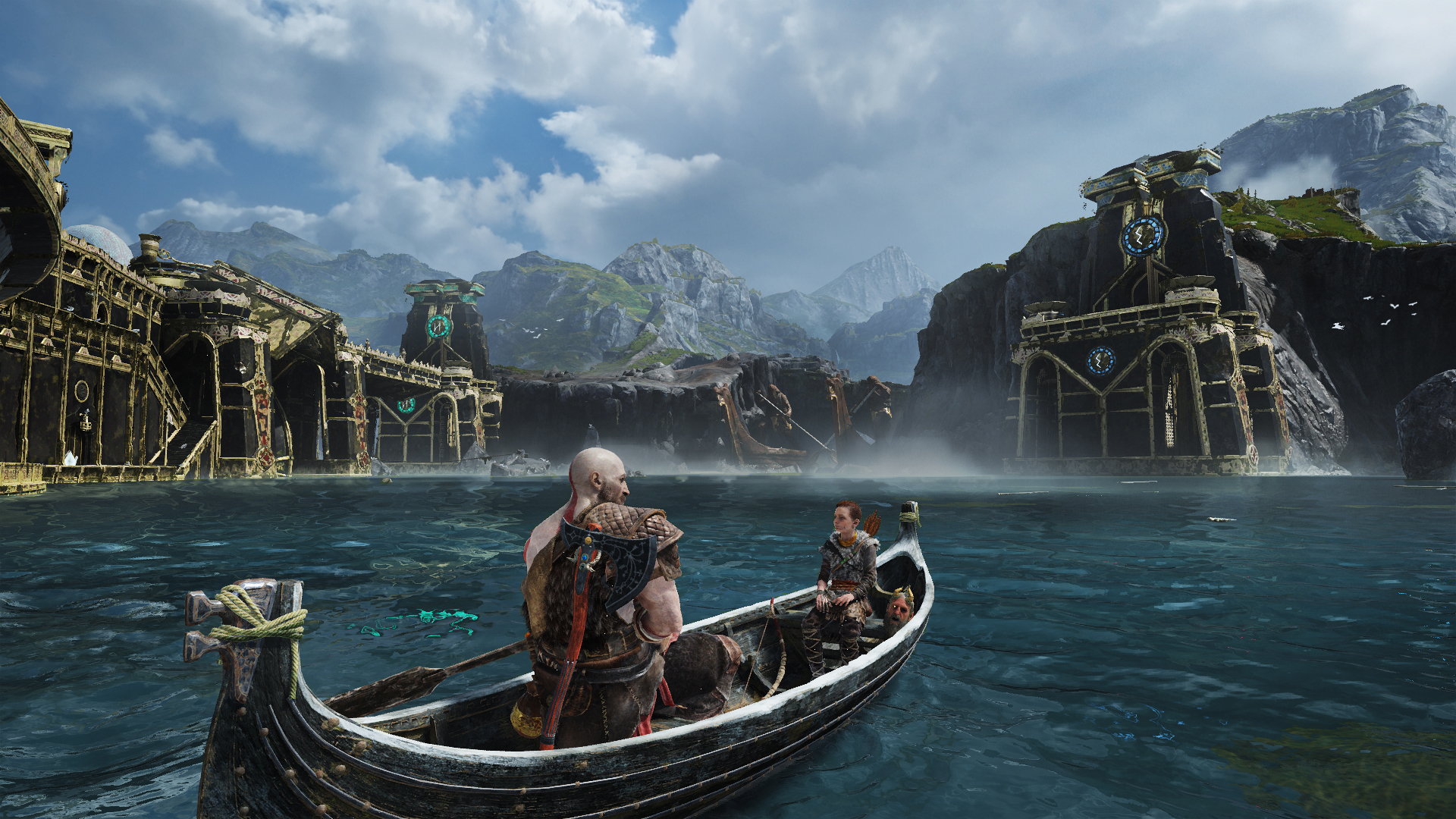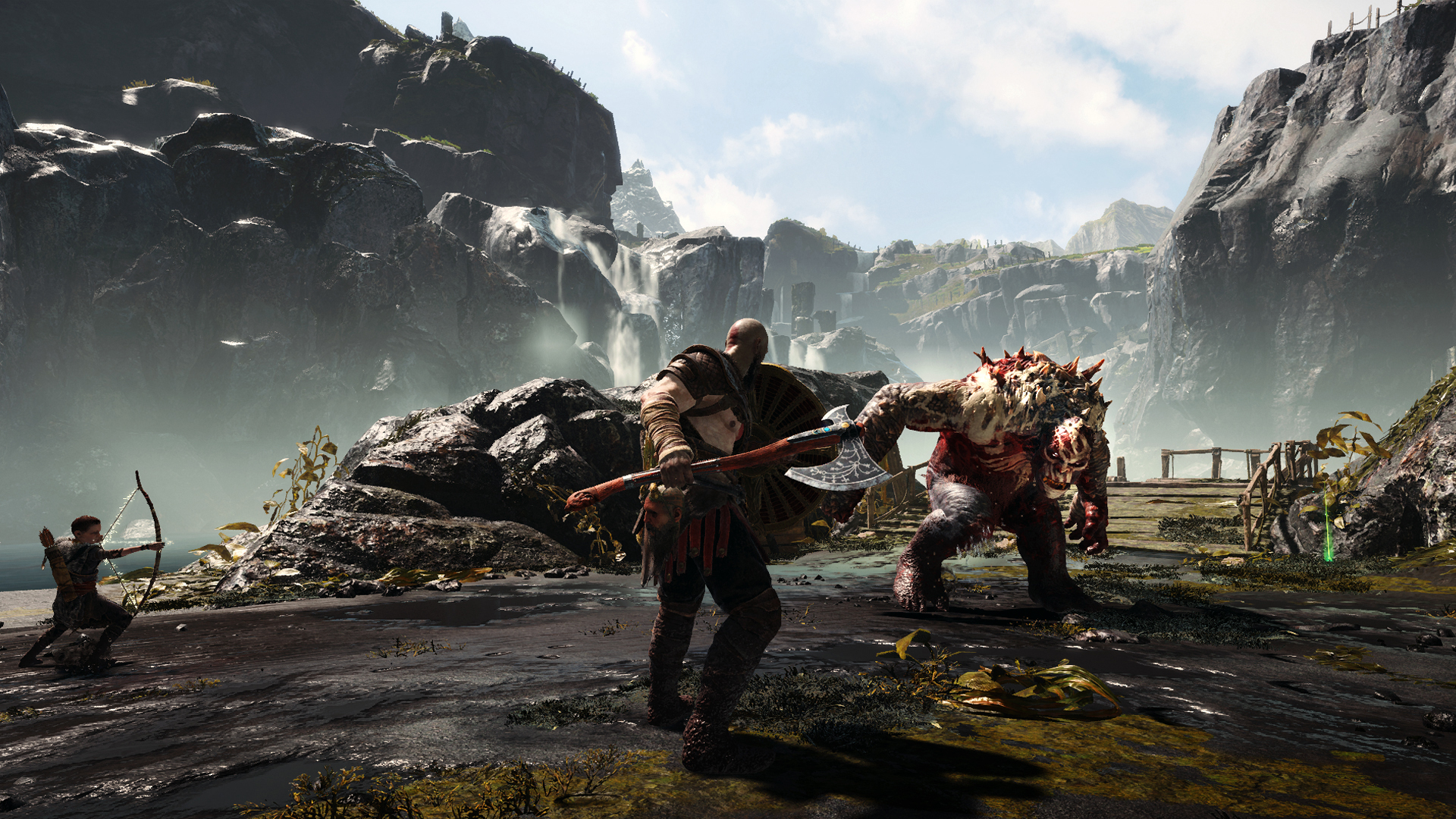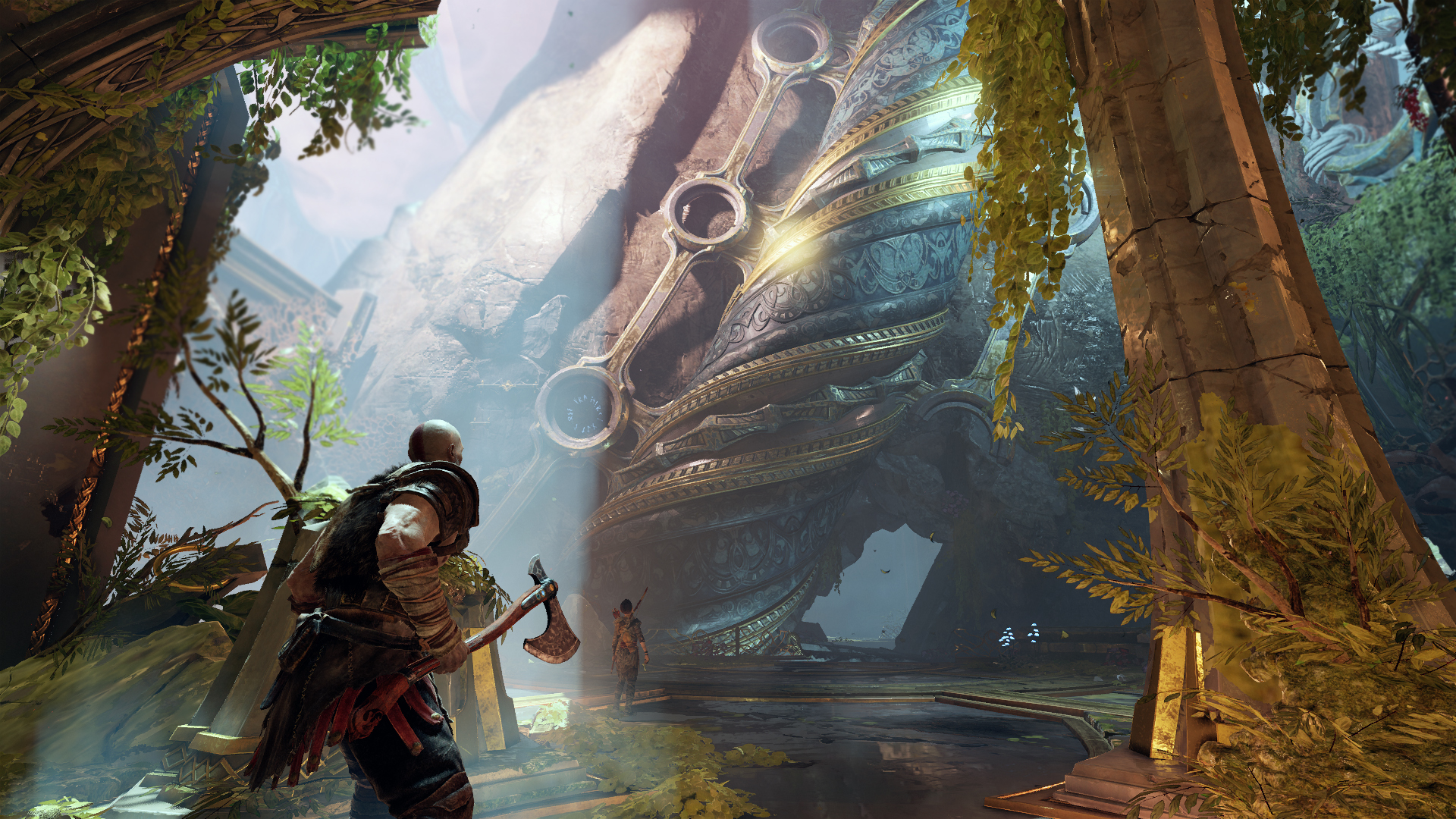If there’s one piece of advice I’d give to anyone about to pick up the new God of War game, it’s this: Whether you’ve played its predecessors or not, toss your assumptions and expectations aside. Because one way or another, this game is sure to surpass them.
If you’re a longtime fan of the God of War series, you’ll likely come away impressed with how this game manages to be much more than just a bloodfest filled with other-worldly monsters, all while managing to maintain the gameplay aspects that made you fall in love with God of War in the first place.
If you haven’t played God of War before, don’t write off this game as just another hack-and-slash romp, and don’t dismiss the protagonist, Kratos, as simply a vengeful barbarian. The relationship between Kratos and his son Atreus adds a much-needed dimension to God of War that makes it feel like a holistic world with a compelling narrative, rather than just a good action game.
Santa Monica Studio’s new God of War installment, to be released on April 20 for PlayStation 4, branches away from its roots in Greek mythology and instead focuses on the gods of the Norse. When we meet Kratos for the first time in five years, he and Atreus are living in a desolate cabin in the woods. They’re preparing for a long and trying journey to the top of a lumbering snowy mountain to scatter the ashes of Atreus’ mother. Kratos doesn’t think his son is ready, but unforeseen circumstances force them to embark on their expedition sooner than they had hoped.

It wouldn’t be a God of War game if there wasn’t a threat at nearly every turn. There’s no shortage of undead monsters, hulking trolls, poisonous revenants, and other foes attempting to thwart your mission along the way. This time around, Kratos is wielding a powerful new Leviathan Axe instead of the Blades of Chaos, while Atreus is equipped with a bow and arrow. What I love about the combat in God of War is that it requires so much more than just button mashing and weapon and armor upgrades. Rather, a healthy mix of quick reflexes and strategy is needed to win. Once you realize this, it becomes clear that even the most formidable enemies can be defeated so long as you’re willing to experiment with different tactics and are sharp enough to observe their attack sequences. Collecting hacksilver and gaining experience points to upgrade your gear and skills helps you take on more challenging enemies as the game progresses. But even with those assets, you’ll continue to lose if you fail to read your enemies’ signals and learn how to block and dodge their assaults.
Read more: How This Former Circus Performer is Turning Google Maps Into the Next Big Thing in Gaming
This can be innately frustrating yet rewarding. God of War shows no mercy when introducing a new type of enemy. Whether it was encountering flying dark elves that were too quick for me to strike with my more powerful (but slower) R2 attack or massive monsters that depleted nearly all of my health with a single blow, the most difficult part of the game for me was often the first battle with new enemies. But defeating creatures in God of War is a bit like riding a bike — once you do it, you’ll have no problem doing it again.
Battle may be at the heart of God of War, but navigating the sprawling Norse realms will require a sizable dose of puzzle-solving skills too, as was the case in previous games. Many of these challenges are simple and involve throwing your axe at special markers to freeze an object in place. This tactic is often used to open doors, move certain elements of the landscape so that you can progress forward, or gain access to special items. Other times, however, you’ll have to scout the area for specific markers to unlock a chest. Many of these small tests are simple, but some may still stump you. For example, I spent more time than I’d like to admit trying to open a trunk that included an item I needed for an upgrade. Doing so involved sprinting back and forth between areas to strike bells marked with a specific symbol so that they all rang out at the same time. It’s an easy task for many, but it’s exactly the type of pressure I tend to struggle with in games.

The deeper you get into the game, the more you’ll realize that Kratos needs Atreus as much as Atreus relies on Kratos. Atreus’ role in battle becomes increasingly important as enemies get more powerful and begin to ambush you in larger swarms. During combat, you can press the square button to command Atreus to shoot an arrow at an enemy, which will stun certain foes and distract others. Later on, Atreus learns to strangle attackers with his bow, which prevents them from evading your attack. And with enough experience points, you can unlock new skills that make Atreus even more helpful.
I did find, however, that the interface for upgrading your skills and gear can be confusing at first, making the process feel unintuitive until well into the game. Atreus can also revive Kratos once per battle with special items called resurrection stones, which can be purchased with hacksilver from local merchants. These can be useful for those moments when you think you’re done with a battle and more enemies suddenly appear, a God of War mainstay.
But Atreus is also important for other reasons. He can translate foreign characters for Kratos that spell out clues for solving puzzles and progressing through the game, for instance. More importantly, Atreus plays a critical role in Kratos’ development as a character, which only becomes more evident as the game progresses. Kratos may teach Atreus how to hunt and fight, but Atreus helps Kratos learn how to connect on a personal level. We see this throughout the game in the ways that their interactions evolve: In the beginning, Kratos responds to Atreus with brief answers of only a few words. Later on, he elaborates and becomes more open with Atreus about his mother and other insights about the world, which serves the dual purpose of world-building for players while also showing character development on Kratos’ part.
The small exchanges between Atreus and Kratos are among the game’s most delightful elements. And although they may not have the perfect father-son relationship, it certainly feels genuine. You’re likely to see a bit of yourself or someone you know in their conversations one way or another. You may see it in the childlike way Atreus sometimes overshares (“Father doesn’t like people either,” he says when meeting a friendly witch who helps the pair), or the way in which Kratos sets high expectations for his son yet continues to treat him like a child in the game’s early chapters.
Review: The XPS 13 is My Favorite Windows Laptop. It Just Got Even Better.
In many ways, Atreus is the ideal companion for a game like God of War, which is set in a world that’s just as spellbindingly beautiful as it is dangerous. I sometimes found myself pausing the game just to appreciate how gorgeous the scenery is. One particularly stunning example can be found in the Lake of Light, a body of water that’s as still as a sheet of glass. A breathtaking evening sky that mixes red and purple hues parted by a towering beam of orange light serves as the lake’s backdrop. It’s breathtaking and certainly worth taking a moment to appreciate.

The reason I say Atreus is the perfect partner for this game is because he explores his surroundings exactly like you might want to wander around a world this intriguing: With childlike wonder and curiosity. Atreus often bounds ahead of Kratos when wandering to the next objective, a habit that makes his boyish persona feel more convincing, while also serving as a guide in case you’re unsure about where to turn next. When you happen upon a new challenge or mysterious creature, Atreus’ responses usually echo my own reactions, whether it be excitement, bewilderment, or even the occasional outburst of frustration. In fact, I wish I could explore more in God of War. There are plenty of side missions and puzzles to keep you busy, but the beautiful landscape is just begging to be explored as an open world.
If you’re worried that the new direction Santa Monica Studios has taken with God of War will make the game any softer, you can stop right now. The new Kratos may be calmer and less vengeful, but he still unleashes punishing and ferocious blows in battle. When your Spartan Rage meter fills up during a fight, pushing the L3 and R3 buttons will throw Kratos into a furious frenzy that enables him to literally rip his enemies apart by hand. It’s gruesome, but effective.
The new God of War is a departure from its predecessors that gives the player more without making any compromises. It’s challenging, beautiful, brutal, rewarding, and even a bit funny on occasion. Whether you’re a fan of the series or not, it’s well worth your time.
More Must-Reads from TIME
- Why Trump’s Message Worked on Latino Men
- What Trump’s Win Could Mean for Housing
- The 100 Must-Read Books of 2024
- Sleep Doctors Share the 1 Tip That’s Changed Their Lives
- Column: Let’s Bring Back Romance
- What It’s Like to Have Long COVID As a Kid
- FX’s Say Nothing Is the Must-Watch Political Thriller of 2024
- Merle Bombardieri Is Helping People Make the Baby Decision
Contact us at letters@time.com